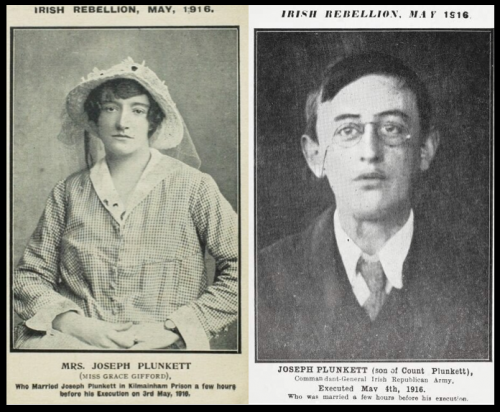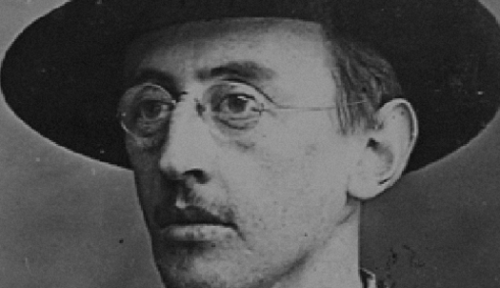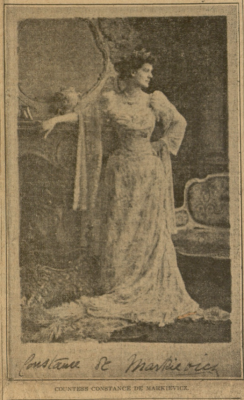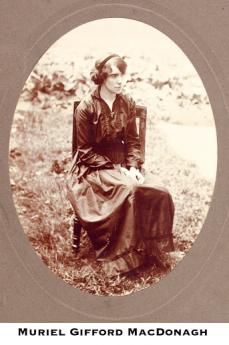Hellraisers Journals: The New York Times Reports on Wedding of Grace Gifford & Joseph Plunkett
-Mother Jones
Monday May 8, 1916
Report from Dublin on the Wedding of a Martyred Irish Rebel

From The New York Times, Front Page, May 7, 1916:
PLUNKETT MARRIED
ON EVE OF HIS DEATH
-----Grace Gifford Bride of the Rebel Leader
in Prison at Midnight.
------
HIS EXECUTION AT DAWN
-----
Her Sister the Widow of MacDonagh-
Major McBride Is Also Put to Death.
-----Special Cable to THE NEW YORK TIMES.
Joseph Mary Plunkett
``````````Dublin, May 6. (Dispatch to The London Chronicle.)-One of the most poignant of the many tragedies in the grim, sordid drama which the last ten days have seen enacted in Ireland is revealed by the announcement in the "Births, Marriages, and Deaths" column of The Irish Times of the marriage of Joseph Plunkett and Grace Gifford. Behind the announcement lies the story of a well-known and honored Dublin family brought to sorrow and tribulation by the crime of the Sinn Fein, and of two refined, artistic girls, well known in Dublin society, whose lives have been wrecked by the insane folly of two men. Behind all looms the strange, mysterious figure of Countess Markievicz, who played so prominent a part in the late tragic events, and who has flitted through all the dark pages of Irish discontent and treason of recent years.
Joseph Plunkett was a rebel leader, one of the seven signatories to the proclamation of the republic, who was shot last Thursday morning. His bride, Grace Gifford, is a daughter of Frederick Gifford, a prominent Dublin solicitor, who lives at Palmerston Park. In the gloomy precincts of Richmond Barracks, where the rebel leaders have been imprisoned, the marriage ceremony was performed on Wednesday at midnight.
Few scenes in this great, futile tragedy can have so wrung the hearts of those who witnessed it as did this hurried joining together in the silent watches of the night of two young lives so soon to be severed by the inexorable decree of human justice. For a few brief hours husband and wife were left together before the last farewell. An hour later, with the dawn of a perfect Spring morning breaking in a cloudless sky, the bridegroom stood facing a firing party in the barracks courtyard. A curt order, the crash of a volley, and the curtain was rung down on the tragedy of two lives.
The horror of the tragedy was enhanced by the fact that Thomas MacDonagh, another of the rebel leaders, who was shot on Wednesday, was the husband of Grace Gifford's sister Muriel. Thus within twenty-four hours, both sisters were widowed.
Bought a Wedding Ring.One chapter in the story was related to me this morning by Mr. Stoker, a well-known jewelery of Grafton Street. On Wednesday evening, as he was about to close the premises, a young and attractive woman, evidently of good social position, entered the shop and asked to be shown some wedding rings. What attracted the jeweler's attention was the fact that, despite her veil, it could plainly be seen that her eyes were red from weeping, while as she spoke she with difficulty stifled convulsive sobs. Surprised at her evident distress Mr. Stoker gently inquired if she was in trouble.
"You should not cry when you are going to be married," he observed. For a moment his visitor hesitated, with the tears running down her cheeks. Then she revealed the whole tragedy, saying she was Punketts' fiancee, that he was to be shot next morning and that she was to be married to him that night.
"For a moment I was thunderstruck," said Mr. Stoker, "and didn't know what to say or do. Somehow or other I managed to express my sympathy with her terrible position, and she thanked me very quietly. Then she selected one of the most expensive rings, paid for it in bank notes, and left the shop."
Further light was cast upon the tragedy by Miss Gifford's mother, whom I saw this morning at her house in Palmerston Park. Her father has been confined to his bed for some time as the result of a stroke. Mrs. Gifford naturally was very much upset over the disaster in which her daughters' lives had become involved.
[She told me:]
I did not know of my daughter's marriage to Plunkett until yesterday...I did not even know definitely that they were engaged, although I had heard it stated. I did not ask Grace, and she did not tell me because she knew I disapproved of the whole thing. I had put it to her that she would be doing a very foolish thing, since the man's actions and associations all along had put him in a peculiarly delicate position, but she apparently did not think so. She was always a very headstrong, self-willed girl, and latterly had lived more or less an independent life.
Blames Countess Markievicz.[Continued Mrs. Gifford, bitterly:]
Countess Markievicz...is responsible for dragging my daughters into this affair. They got to know her several years ago, and have been largely under her influence. We knew nothing of what was going on, however, and no one was more surprised than we were when the revolt broke out.
I first heard of her marriage yesterday from Grace herself. I went to see her sister, Mrs. MacDonagh, and while I was there Grace came into the room. She walked right across to me and held out her left hand, on the third finger of which was a wedding ring. Then she told us she had been called out of bed Wednesday night and had been taken to Plunkett to marry him.
Although the announcement was a great surprise and shock to me, I had been in a way prepared by an incident which took place the previous night. Grace left home that day, Wednesday, after luncheon, and during the evening sent a telephone message through a neighbor saying she was staying in town for the night.
I sat up to wait for my son. Toward midnight there came a knock at the door. The maid had gone to bed and I opened the door myself. Instead of my son I found a policeman, while in the road outside was a big motor car with two English officers in it. One of the officers got out of the car and told me he had an important letter for Mrs. Plunkett. Thinking they meant Plunkett's mother, the Countess. I said she did not live here. He went and consulted the other officer and then came back and asked for Miss Grace Gifford. I told him she was not at home, that she was staying in town.
When I saw Grace next day she told me the letter was to tell her to go to the prison, where they were to be married. She said they were married at midnight, and he was shot shortly afterward.
That was all the mother knew. She had not seen or heard from her daughter since, and she did not know where she was staying.
Mrs. Gifford said her other daughter Muriel, was married to MacDonagh four years ago. They had two children, a boy, now 3 years old, and a girl of 18 months. MacDonagh was a professor in University College, at Dublin, and also had done considerable journalistic work and written several books.
Plunkett said he was a son of Count Plunkett holder of a papal title. If so, the rebel leader was at one time editor of a monthly publication called The Irish Review, now extinct. He had written a good deal, both in prose and verse. Miss Gifford, who is 28 years old, contributed pen-and-ink caricatures frequently to The Irish Review. She undoubtedly is gifted with considerable talent, although her work shows a tendency to the exaggerations of the futurist style. She is fair, of medium height and has typically Irish eyes.
She is described by all who know her as a particularly handsome and attractive girl. For some time, her mother told me, she talked of going to America to work-two of her sisters and two brothers are already there. Another brother came over in the Canadian contingent, and is at present in England.
[Photograph added.]
SOURCE
The New York Times
(New York, New York)
-May 7, 1916
http://query.nytimes.com/gst/abstract.html?res=9F00E5DC1439E233A25754C0A...
IMAGES
Irish Rebels of 1916, Grace Gifford, Joseph Plunkett
https://twitter.com/gracegifford16
http://catalogue.nli.ie/Record/vtls000643936
Irish Rebels of 1916, Joseph Mary Plunkett, Proclamation Signatory
http://www.ireland.ie/signatories
Irish Rebels of 1916, Countess Constance De Markievicz
-from Gaelic American of May 6, 1916
http://digital.library.villanova.edu/Item/vudl:274286#?c=0&m=0&s=0&cv=0&...
Irish Rebels of 1916, Muriel Gifford MacDonagh
http://www.ruaruth.com/muriel-macdonagh-part-1/
Remembering 1916: Muriel McAuley on her grandparents, Thomas and Muriel Gifford MacDonagh and her great aunt Grace Gifford Plunkett:
[video:https://www.youtube.com/watch?v=f8B4fhxXXjU&list=PLO1vZ8TW0ck6thSAz9AsR1... width:500 height:315]
Grace - Jim McCann




